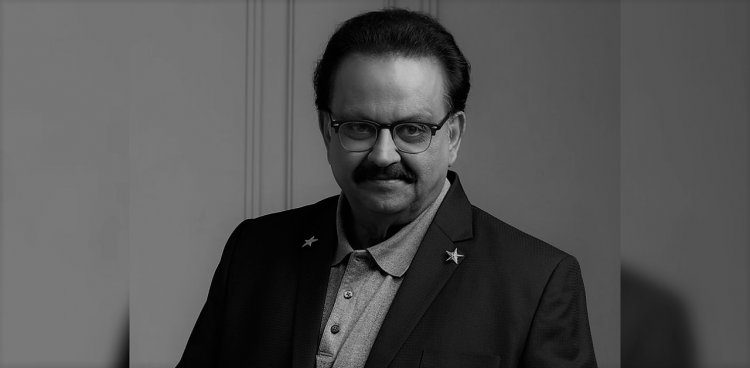S.P. Balasubrahmanyam: The Versatile Music Maestro

Legendary playback singer S.P. Balasubrahmanyam passed away at a private hospital in Chennai on Friday. He was 74.
Balasubrahmanyam was hospitalised in August at MGM Healthcare after testing positive for COVID-19, and while he reportedly did well initially, he took a turn for the worse, and was put on a ventilator and ECMO support.
On September 7, he tested negative for COVID-19 but continued to be on the ventilator and ECMO even as he participated in passive physiotherapy.
Popularly known as SPB, Balasubrahmanyam made his singing debut in 1966 with Telugu movie Sri Sri Sri Maryada Ramanna. He has sung over 40,000 songs in as many as 16 languages including Telugu, Tamil, Malayalam, Kannada, and Hindi.
Balasubrahmanyam was also a voice-over artist. He was the voice-over artist for actor Kamal Hassan, whenever the latter’s Tamil movies were dubbed in Telugu. Balasubrahmanyam also acted in a few movies.
He is survived by his wife, a son and a daughter: both are playback singers.
Balasubrahmanyam sang thousands of songs in South Indian languages and in Hindi for five decades for generations of actors from MGR, Sivaji Ganesan and Gemini Ganesan, down to the stars of the present and is the winner of six national awards. He also had won the hearts of several fans across the world for whom his songs have marked milestones.
Born Sripathi Paditha Arathyula Balasubrahmanyam, in 1946, to Nelloor-based Harikatha exponent Sambamurthy, SPB’s ambition was to become an engineer. His failure to clear a subject in his PUC course forced him to pursue the now-defunct AMIE course in Chennai.
His talent was spotted by another playback singer and music director S.P. Kothandapani, who was sitting among the audience at a competition at the Andhra Social and Cultural Society (ASCA) and he provided him with an opportunity to sing in the Telugu film Sri Sri Mariatha Ramanna. SPB was one among the four singers — S.P. Kothandapani, P. Susheela, P.B. Srinivas and Eelapada Raguramaiha- who rendered the ragamalika song, Emi Evindha Mogum.
“Anyone who had listened to the part he rendered for Shoban Babu would have realised the potential in the voice. It proved to be a prelude for a record career in film music,” said Mr. Vamanan. As they say, the rest was history.
His father was a Harikatha Vidwan (a narrator of religious tales) in Andhra Pradesh who sang religious folk songs in the village square for a living. This was Balasubrahmanyam’s humble introduction into the art.
He had absolutely no formal tuition in Carnatic music. But he had such a good ear for it that the absence of any classical training was no hindrance. He admits: "Even today I don't know the ABC of classical music."
One day in 1963, when he was studying engineering in Madras, a friend entered his name for a light music competition. Balasubrahmanyam wrote the song, composed the score and sang it. He was adjudged the best even before the song was finished.
Even so, it was a good three years before his first recording. He sang with P. Sushila, P.B. Srinivas and the late Raghuramiah. Sushila recalls: "He was barely 18 at the time and I remember wondering if he would manage. But the moment I heard him, my doubts vanished."
The big singing break in Tamil films came in 1969 when M.G. Ramachandran asked noted music director K.V. Mahadevan to try him out in Adimai Pen (Slave Girl). His first song was an instant hit. Balasubrahmanyam had arrived. In doing so, he virtually dethroned T.M. Soundarajan and almost toppled Ghantasala from the number one slot in Telugu films.
K. Vishwanath, the well-known Telugu director, explains: "His rendition does not follow the regular, linear and methodical approach. Instead, Balu provides the dramatic impetus which makes his songs come alive."
The film Keladi Kanmani was a hit which established him as an actor.
Praise from his peers seems to follow in the wake of his every artistic endeavour. Balachander cast him in a cameo role in his Manathil Urudhi Vendum in which he had to play a fun-loving doctor who has no wife but constantly imagines that he does.
His role in the film won him such rave reviews that two of Balachander's associates promptly signed him up for their own ventures. The first of these, Keladi Kanmani (Listen Sweetheart), was released late last year. In it Balasubrahmanyam plays a widower who is unable to remarry because his only daughter won't let him.
The film was a roaring success. Balasubrahmanyam had arrived- this time as a fine actor. His next offering, Sigaram, though, flopped at the box-office. But it would take more than just one flop to deflate Balasubrahmanyam mentally or physically.
Six more movies are in the pipeline. All of them provide him with meaty roles he can get his teeth into. "No prancing around trees and singing sugary-sweet duets for me," he says, adding that he has rejected six offers in the past month alone. And is his choosiness also a reflection of his priorities? "Of course. Playback singing comes first every time."
Despite the many acting offers, playback singing still remains Balasubrahmanyam's first love.
Part of the reason for his enduring success is his versatility. He has dubbed voices for several leading Tamil heroes in Telugu and composed music too, two prominent examples being Kizhake Pogum Rail (Tamil) and Mayuri (Telugu) for which he was awarded the best music director prizes from the respective state governments. He also wrote the background score for the Hindi film Hum Paanch.
But his ultimate ambition is to direct a film. You can gauge his seriousness and professionalism from the fact that he intends to give himself another five years before he even embarks on it: "I want to learn much more before I turn in that direction,'' he says.
Balasubrahmanyam followed a punishing schedule that would exhaust many-a-younger mortal. He recorded from seven to nine in the morning, shoots from nine to six with an hour's break in-between and dashes back for yet more recording from six to 10 in the night. This sometimes-meant recording as many as 19 songs in a single day. In all, he has sung more than 19,000 songs since he began his career.
Having enjoyed supremacy as the south's premier playback singer, S.P. Balasubrahmanyam has made his mark in Hindi cinema as well. In his quest for versatility, he straddles the fields of singing, composing and dubbing with the ease of a man sure of his multifarious talent.
When he sang ‘Tere mere beech mein’ in K. Balachander's 1980 superhit Ek Duje Ke Liye he instantly touched the heartstrings of every lover in the country. Ten years later, his golden voice crooning Maine Pyar Kiya turned it into one of the biggest hits of Indian celluloid and won him the 1990 Filmfare Award. It sold more than five million cassettes last year, compared with the 3.5 million of another big hit, Chandni.
While Ek Duje Ke Liye was his breakthrough into Hindi films and Bollywood, Maine Pyar Kiya was abundant proof that he could succeed on a mega-level in Hindi movies. And if anyone still doubts the impression he has made in' the north, the legendary name of Naushad should silence him. Balasubrahmanyam is working with the composer on Tere Payal Mere Geet.
‘Paadum Nila’ (Singing Moon) as he was called by his fans had a lilting voice with the finest traces of great singers. “His was a breeze-like voice of A.M Raja, with the softness of the P.B. Srinivas and the effortlessness of Mohamed Rafi,” said film music historian Vamanan.
SPB bagged his first national award for Sankarabharanam, even though all the songs in the Telugu film are based on pure Carnatic ragas. He was never formally trained in Carnatic music, but that did not stop him, not then, not ever. “Even SPB had apprehensions about taking on the assignment as he had no proper training in classical music. It was T.K. Pugazhlendi, the assistant of music director K.V. Mahadevan who persuaded SPB to render the songs,” said Mr. Vamanan. And what a hit they turned out to be.
The second time he won the award, was for his first Hindi song, Tere Mere Beech Mein in the film Ek Duuje Ke Liye. Two more awards came his way for the Telugu films Sagarasangamam and Rudraveena. Sangeetha Sagara Ganayogi Panchakshara Gavai, the Kannada film won him the fifth national award.
The award for Tamil films eluded him many years even though his collaboration with music directors Ilayaraja and M.S. Viswanathan had resulted in innumerable memorable duets, solos, folk songs, spoofs and songs with classical touches. He finally won it for the song Thanga Thamarai in the film Minsara Kanavu for which the music was scored by A.R. Rahman.
SPB in an interview said Tamil films offered a lot of scenes and scope in which a song sat perfectly, without any artificiality.
Later in the film Suryakanthi, he sang the number Naan Endral Avalum Naanum and late Chief Minister Jayalalithaa rendered the English verses. His playback songs for thespian Sivaji Ganesan, particularly Pootuvaitha Mugamo in Sumathi En Sundari and Emuna Nadhi Inkey in Gowravam were equally popular.
Even though there is the argument that MGR had roped in SPB because of his difference of opinion with T.M. Soundararajan (TMS), Mr. Vamanan said MGR continued to prefer TMS to render duets and songs with political messages. MGR also gave opportunities to K.J. Jesudas and Jayachandran.
SPB sang Aval Oru Navarasa Natakam in the film Ulagam Suttrum Vaaliban and Paadum Pothu Naan Thendral Kattru and Angey Varuvathu Yaro in the film Netru Indru Naalai.
Even though he worked with other music directors like V. Kumar, Vijaybaskar and Shyam, SPB’s career graph ascended with the arrival of Ilayaraja and actors such as Rajinikant and Kamal Haasan.
Even with Ilayaraja it did not happen immediately. SPB could not get an opportunity in Annakili, Patrakalai, Kavikuyil, Durgadevi, Deepam and Thunai Iruppal Meenakshi. Once the combination began, it was then unstoppable. Bhuvana Oru Kelvikuri offered him two outstanding songs- Raja Enbar Mandhiri Enbar and Vizhiyile Malarnthathu. The duets he rendered with S. Janaki were irreplaceable.
At a time when Ilayaraja started dominating film music, MSV’s music for Ninaithale Inikkum rocked and almost all the songs were rendered by SPB in the film. Later when MSV and Ilayaraja came together to score music for Mella Thiranthathu Kathavu, SPB was their natural choice.
SPB was the favourite singer of MSV and would always cherish the song Ilakkanam Marudho in the film Nizhal Nijamahirathu.
Now, when SP Balasubrahmanyam is no more with us physically, his body of work and his eternally genius music and voice will be played for decades.
Rest in Peace SP Balasubrahmanyam!















































